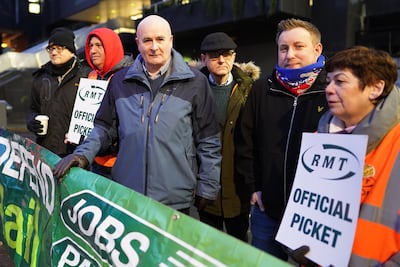Britain's rail network was largely shut on Tuesday as the latest round of strikes began on the first working day of 2023.
The strikes are set to bedevil the country most of the week as the Rail, Maritime and Transport Union calls its workers out for two 48-hour spells.
Up to 80 per cent of trains — or four out of five — were not running on Tuesday, union figures showed. Many places have no services, including most of Scotland and Wales.
They are the third and fourth RMT strikes of the season, after two December walkouts caused havoc before Christmas.
It comes amid a wave of industrial unrest in Britain that has seen postal workers, border guards, ambulance staff, nurses and others vote to walk out.
The RMT's general secretary Mick Lynch, who joined a picket line at London Euston station on Tuesday, accused the government of blocking a deal on pay and job security.

“There is an unprecedented level of ministerial interference, which is hamstringing rail employers from being able to negotiate a package of measures with us,” said Mr Lynch.
“We will continue our industrial action campaign while we work towards a negotiated resolution.”
Transport Secretary Mark Harper said there was a “very fair pay offer” on the table that a third of RMT members backed in the most recent ballot.
“I think it is time that the RMT got off the picket line and round the negotiating table,” Mr Harper told Times Radio.
The union said it was “available around the clock” for talks.
About 40,000 employees of Network Rail and 14 operating companies were expected to walk out on Tuesday, Wednesday, Friday and Saturday.
The union represents station staff, track workers, signallers, guards, catering staff, cleaners and other workers on Britain's railways.
A separate union representing train drivers, Aslef, is planning to walk out on Thursday to demand better pay at a time of high inflation.
Aslef general secretary Mick Lynch said a meeting was being arranged for early next week with “all the actors including the rail minister”, Huw Merriman.
Although London Underground service is mostly unaffected, many suburban train services in the capital are not running because of the strikes.
In addition, drivers at a London bus company, Abellio, are planning eight days of strikes this month, beginning on Wednesday.
In other disputes, workers at the National Highways agency are on strike on Tuesday and Wednesday.
Ambulance workers are expected to walk out on January 11, adding to pressure on the strained National Health Service.
Prime Minister Rishi Sunak has suggested he will bring in new laws to curb strike disruption.




































